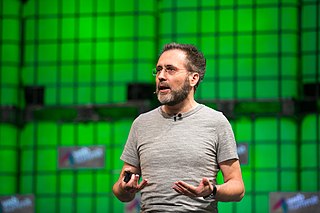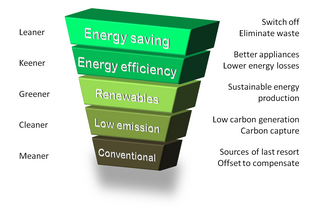
Water conservation aims to sustainably manage the natural resource of fresh water, protect the hydrosphere, and meet current and future human demand. Water conservation makes it possible to avoid water scarcity. It covers all the policies, strategies and activities to reach these aims. Population, household size and growth and affluence all affect how much water is used.

Energy conservation is the effort to reduce wasteful energy consumption by using fewer energy services. This can be done by using energy more effectively or changing one's behavior to use less and better source of service. Energy conservation can be achieved through efficient energy use, which has some advantages, including a reduction in greenhouse gas emissions and a smaller carbon footprint, as well as cost, water, and energy savings.

In economics, the Jevons paradox occurs when technological progress increases the efficiency with which a resource is used, but the falling cost of use induces increases in demand enough that resource use is increased, rather than reduced. Governments, both historical and modern, typically expect that energy efficiency gains will lower energy consumption, rather than expecting the Jevons paradox.

Energy policies are the government's strategies and decisions regarding the production, distribution, and consumption of energy within a specific jurisdiction. Energy is essential for the functioning of modern economies because they require energy for many sectors, such as industry, transport, agriculture, housing. The main components of energy policy include legislation, international treaties, energy subsidies and other public policy techniques.

The Carbon Trust is a United Kingdom-based consultancy established in March 2001. Its aim is to accelerate the pace of private sector decarbonisation and increase energy efficiency in the United Kingdom and worldwide.

A low-energy house is characterized by an energy-efficient design and technical features which enable it to provide high living standards and comfort with low energy consumption and carbon emissions. Traditional heating and active cooling systems are absent, or their use is secondary. Low-energy buildings may be viewed as examples of sustainable architecture. Low-energy houses often have active and passive solar building design and components, which reduce the house's energy consumption and minimally impact the resident's lifestyle. Throughout the world, companies and non-profit organizations provide guidelines and issue certifications to guarantee the energy performance of buildings and their processes and materials. Certifications include passive house, BBC—Bâtiment Basse Consommation—Effinergie (France), zero-carbon house (UK), and Minergie (Switzerland).

Urs Hölzle is a Swiss-American software engineer and technology executive. As Google's eighth employee and its first VP of Engineering, he has shaped much of Google's development processes and infrastructure, as well as its engineering culture. His most notable contributions include leading the development of fundamental cloud infrastructure such as energy-efficient data centers, distributed compute and storage systems, and software-defined networking. Until July 2023, he was the Senior Vice President of Technical Infrastructure and Google Fellow at Google. In July 2023, he transitioned to being a Google Fellow only.
Domestic housing in the United Kingdom presents a possible opportunity for achieving the 20% overall cut in UK greenhouse gas emissions targeted by the Government for 2010. However, the process of achieving that drop is proving problematic given the very wide range of age and condition of the UK housing stock.
Building performance is an attribute of a building that expresses how well that building carries out its functions. It may also relate to the performance of the building construction process. Categories of building performance are quality, resource savings and workload capacity. The performance of a building depends on the response of the building to an external load or shock. Building performance plays an important role in architecture, building services engineering, building regulation, architectural engineering and construction management. Furthermore, improving building performance is important for addressing climate change, since buildings account for 30% of global energy consumption, resulting in 27% of global greenhouse gas emissions. Prominent building performance aspects are energy efficiency, occupant comfort, indoor air quality and daylighting.

An energy audit is an inspection survey and an analysis of energy flows for energy conservation in a building. It may include a process or system to reduce the amount of energy input into the system without negatively affecting the output. In commercial and industrial real estate, an energy audit is the first step in identifying opportunities to reduce energy expense and carbon footprint.
Energy Saving Trust is a British organization devoted to promoting energy efficiency, energy conservation, and the sustainable use of energy, thereby reducing carbon dioxide emissions and helping to prevent man-made climate change. It was founded in the United Kingdom as a government-sponsored initiative in 1992, following the global Earth Summit.
FortisBC is a British Columbia based regulated utility that provides natural gas and electricity. FortisBC has approximately 2,600 employees serving more than 1.2 million customers in 135 B.C. communities and 58 First Nations communities across 150 Traditional Territories.

Efficient energy use, or energy efficiency, is the process of reducing the amount of energy required to provide products and services. There are many technologies and methods available that are more energy efficient than conventional systems. For example, insulating a building allows it to use less heating and cooling energy while still maintaining a comfortable temperature. Another method is to remove energy subsidies that promote high energy consumption and inefficient energy use. Improved energy efficiency in buildings, industrial processes and transportation could reduce the world's energy needs in 2050 by one third.

The National Energy Foundation (NEF) is an independent British charity, established to improve the use of energy in buildings.

The Food, Conservation, and Energy Act of 2008 was a $288 billion, five-year agricultural policy bill that was passed into law by the United States Congress on June 18, 2008. The bill was a continuation of the 2002 Farm Bill. It continues the United States' long history of agricultural subsidies as well as pursuing areas such as energy, conservation, nutrition, and rural development. Some specific initiatives in the bill include increases in Food Stamp benefits, increased support for the production of cellulosic ethanol, and money for the research of pests, diseases and other agricultural problems.

The Bureau of Energy Efficiency is an agency of the Government of India, under the Ministry of Power, created in March 2002 under the provisions of the nation's 2001 Energy Conservation Act. The agency's function is to encourage the efficient use of energy in India by developing programs to support it. For example, the government proposed to make it mandatory for certain appliances in India to have ratings by the BEE from January 2010 onwards. The mission of the Bureau of Energy Efficiency is to institutionalise energy efficiency services, enable delivery mechanisms in the country and provide leadership to energy efficiency in all sectors of the country. Its primary objective is to reduce energy intensity in the economy.
The Association for Decentralised Energy (ADE), formerly the Combined Heat and Power Association, is an advocate of an integrated approach to delivering energy locally. The ADE was founded in 1967 as the District Heating Association, becoming the Combined Heat and Power Association in 1983, and was then renamed to the Association for Decentralised Energy on 12 January 2015. The ADE has over 100 members.

Bank Australia is an Australian customer-owned bank based in Collingwood, Victoria. The organisation can trace its origins back to 1957, when the CSIRO Co-operative Credit Society was formed. Over succeeding years, mergers among 72 other credit unions and co-operative banks eventually led to the creation of the Members & Education Credit Union (mecu) in 2003, which became Bankmecu in 2011, and Bank Australia in 2015.
Strahlendes Klima e.V is a registered non-profit organization that produces films and media focusing on the issues of energy and resources for an environmentally friendly, more climate conscious world. Their main concept is to build a decentralised activist network in order to distribute topical content in terms of open licence publications. By offering free educational media they aim to raise awareness for environmental conservation.

The Energy Hierarchy is a classification of energy options, prioritised to assist progress towards a more sustainable energy system. It is a similar approach to the waste hierarchy for minimising resource depletion, and adopts a parallel sequence.













